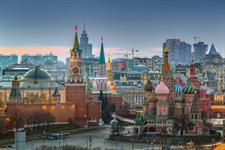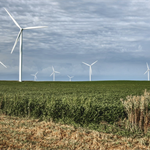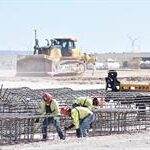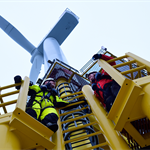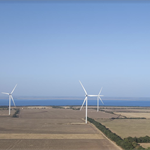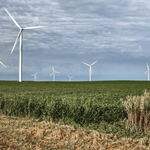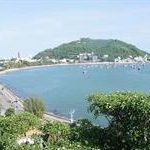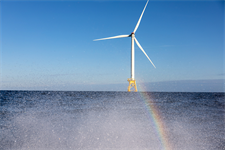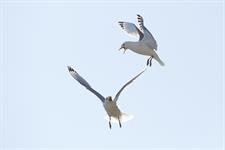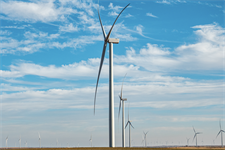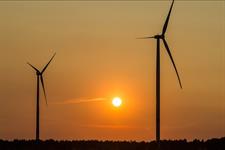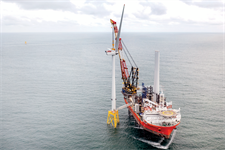Major wind industry players halt new Russian investments
Energy Disrupter

Finland’s Fortum, the biggest wind power player in Russia through its joint ventures, and turbine manufacturer Siemens Gamesa (SGRE) have both confirmed today (3 March) that they will not enter into any new business agreements in the country.
It follows similar announcements by other major players in the sector this week, including Ørsted and Vestas. Fortum CEO Markus Rauramo said: “Business as usual cannot continue. For now, we have stopped all new investment projects in Russia until further notice.”
The latest statements came as confirmed reports emerged that the Syvash Wind Farm, in Ukraine’s Kherson region, was hit by a Russian missile when the area came under heavy bombardment on the first day of the invasion in Ukraine last week.
Staff safety
The wind majors have stressed concerns for the safety of employees and colleagues in both Ukraine and Russia, expressing dismay over the humanitarian crisis the world is now witnessing unfold.
Most companies active in Russia say they are continuing to meet legal contractual obligations to existing customers, but add they will abide by any future sanctions relating to the Russian energy sector that may arise. For now, the focus is on staff safety.
“In this unprecedented situation, our primary focus and concern is for our employees’ wellbeing and the security of supply of customers in all our countries,” said Rauramo.
The company’s Russian wind and solar portfolio is around 3.4GW, including the recently awarded 1.4 -1.6 GW to be commissioned in 2025–2027.
Today, Ruaramo said he was “devastated” by Russia’s attack on Ukraine. “Over the past week, we have already witnessed what great suffering the war has caused to people. There is no justification for this. The consequences will be far-reaching.”
Vestas, which has the biggest market share in the country by some way, along with manufacturing capacity there, has said: “In light of the ongoing and indefensible war initiated by the Russian government, Vestas will stop any new commercial activity in Russia until further notice.”
In a statement, the company, which is Fortum’s preferred turbine supplier for its Russian wind projects, with more than 1GW of contracts, also condemned the Russian government’s invasion of Ukraine, expressing fears for staff.
“Many of our employees and their families have been displaced and fear for their safety and for their future. We worry about the wellbeing of our many colleagues, customers and business partners in the besieged country. As a result of the invasion, Vestas’ manufacturing, transportation, construction and service operations in Ukraine and Russia have been severely disrupted. The existence of this violent conflict is inexcusable and untenable.”
Siemens Gamesa
Siemens Gamesa, which has manufacturing in Russia but no activity in Ukraine, also confirmed to Windpower Monthly that it too is stopping new activity in Russia, saying it “strongly condemns the invasion of Ukraine and calls on Russia to cease hostilities immediately”.
In response to a request for comment, SGRE said: “We are shocked and appalled at the humanitarian disaster happening in Ukraine and stand in solidarity with its people. We support the sanctions imposed by the international coalition on Russia and our teams are also working hard to understand the implications of them on our business and will take the action necessary to respect them. Further, as a result of the conflict we will stop new commercial activities in the country until further notice and are continuously assessing the potential impact this war has on Siemens Gamesa.”
Earlier this week, Mads Nipper, CEO of Ørsted, also announced immediate action where it could, including for its wind business, and confirmed it would fully support and immediately execute any future sanctions in relation to its gas imports to Denmark. “The Russian aggression goes against everything that Ørsted stands for, and we have therefore taken significant steps in accordance with our values as a company,” he said. “We have made sure that no direct Ørsted suppliers for the build-out of renewable energy are Russian.” The company added that it has also stopped sourcing biomass and coal from Russia for its power stations and will not enter into new contracts with any Russian companies.
Ukrainian wind farm hit
Meanwhile, Emergy’s Syvash 245MW wind farm, co-developed with TotalEnergies and located in Ukraine’s Kherson region, near Crimea, is believed to have been struck by Russian missiles, as the region came under heavy attack.
East Renewable AB, the holding company for the Syvash wind farm, said it was informed on February 24 at 5am that Russian troops were in the area and that its personnel began an immediate de-energisation of the wind farm before evacuating the area.
Half an hour later a rocket hit the wind farm’s substation as well as at least one of its turbines.
The statement said: “At least one of the turbines [was] on fire. Damage to the second turbine is unconfirmed. The first reports are that damage to the substation is limited to an auxiliary transformer. There are so far no reports of any casualties or harm to personnel.”
The company said its focus was now the safety of its people and that it was no longer safe to get to the wind farm so it could not assess any further damage.
It added that its insurance providers had been informed of the attack.
Emergy told Windpower Monthly that investment plans for Ukraine, going forward, are “not our main concern or priorities at the moment”. A spokeswoman for the Norwegian company said: “Our main goal is the security and wellbeing of our employees in the country.”
Emergy is the second biggest wind developer and operator in Ukraine. In a statement to Windpower Monthly, a spokeswoman said: “As of morning of the 2nd of March 2022, we have received confirmed information that all our nine remaining employees in Ukraine at that point of time were safe and in good health, spread out on a number of locations throughout Ukraine. We have offered to help with evacuation.” She said the company does have regular contact with them but the situation “is still very serious and unclear”.
Existing operations
Pending possible sanctions, where existing operations continue, safety is obviously paramount. As Vestas noted, service operations “will operate to the extent we can ensure the safety of our service colleagues. The situation continues to develop fast, and in addition to the above, we continue to assess what further impact the war and any sanctions could have on Vestas.”
Raumaro said Fortum, which has 7,000 colleagues in Russia and a substantial, diverse generating portfolio in Russia beyond wind, continues to fulfil its duties to its customers and will comply with all laws and future sanctions if they come. He went on to stress: “Among all the uncertainty, one thing is absolutely clear: Europe’s urgent need for an energy transition. The current developments have also added a new variable to the equation of sustainability, affordability and security of supply, which is independence. We are actively supporting this through our investments into clean power, increasingly clean gas and flexibility.”
To that end, the IEA today also issued a ten-point plan to the EU — with “accelerate the deployment of new wind and solar projects” at number 4 in the list — as a means to reduce reliance on Russian supplies by over a third. Strong and accelerated investment in wind and solar will reduce gas use by 6 billion cubic metres within a year, the plan says.

